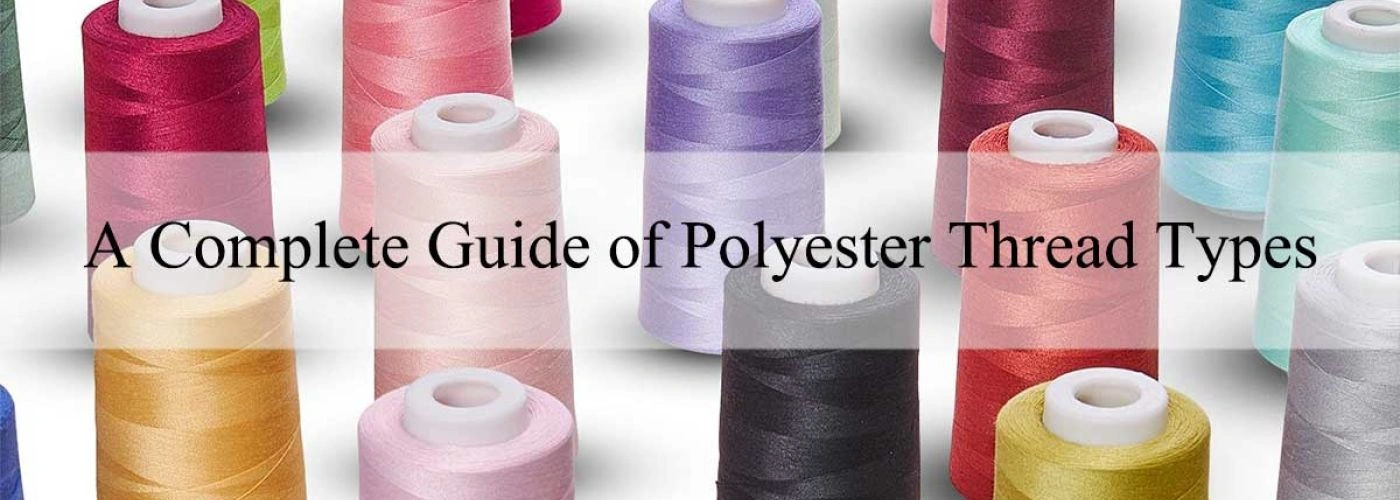
A Complete Guide of Polyester Thread Types
Why is polyester thread a staple in sewing? It’s known for its durability, versatility, and resistance to moisture. Whether you’re working on garment construction, embroidery, or heavy-duty upholstery, choosing the right polyester thread can make all the difference. This guide will help you understand the different types of polyester threads and how to select the best one for your projects..
What is Polyester?
Polyester is a synthetic fiber derived from chemical compounds. Primarily made from polyethylene terephthalate (PET), it is created by mixing ethylene glycol and terephthalic acid. This innovative material is celebrated for its durability, as it resists tearing, stretching, and abrasions, making it ideal for a wide range of applications including outdoor gear and home furnishings.
A notable feature of polyester is its moisture resistance. It repels water and wicks away moisture, keeping items dry—especially useful in outdoor settings. Polyester is also wrinkle-resistant, helping fabrics retain their shape without frequent washing or ironing. Its moldability when heated enhances its versatility and recyclability.
Despite its numerous advantages, polyester is not biodegradable, raising environmental concerns. However, advancements are being made towards creating more sustainable options. Polyester’s versatility extends to various uses such as clothing, home textiles, automotive parts, and even industrial applications like ropes and tarps.
Types of Polyester Threads: Production, Features
Polyester threads come in several types, each with unique features and applications. Recognizing these differences aids in choosing the suitable thread for your sewing needs.
Spun Polyester Thread
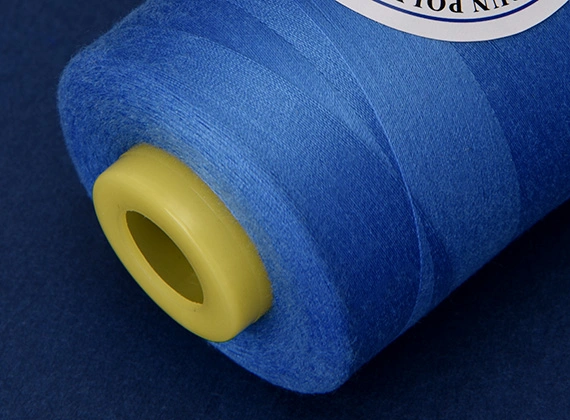
Production: Spun polyester thread is created by twisting together short polyester fibers, much like the process used to produce cotton threads. These fibers are spun into a thread of the desired thickness, offering a cotton-like appearance with added elasticity.
Feature: Spun polyester is cost-effective to manufacture, making it an affordable option. However, it lacks the strength of corespun, filament, or trilobal polyester threads.
Textured Polyester Thread
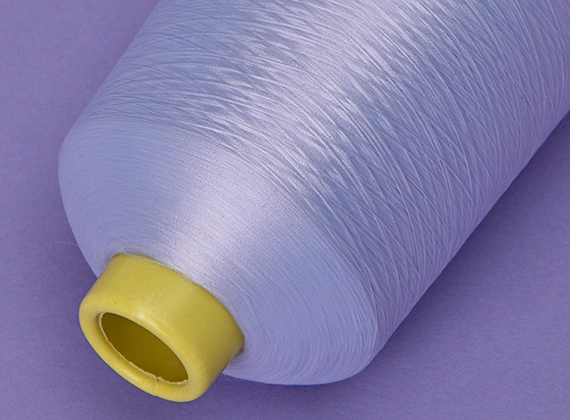
Production: Polyester fibers are first melted and extruded to form continuous filaments, which are then drawn to orient the molecules and impart strength. These filaments may undergo additional texturing processes, such as crimping or twisting, to create the desired texture. Finally, the textured filaments are assembled into threads
Feature: Polyester texture thread is 100% polyester continuous filaments, used for rolled hems and for sewing on stretchy materials, such as spandex, lycra, or swimsuit material. Textured polyester threads provide better stitch coverage compared to spun polyester or filament polyester threads, thanks to its fluffiness and ability to recover once stretched.
Corespun Polyester Thread
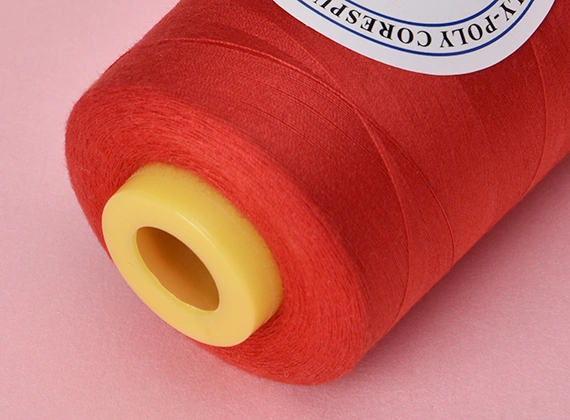
Production: corespun polyester thread combines a strong filament polyester core wrapped in spun polyester, offering a perfect blend of durability and versatility. Often referred to as 'Poly-core spun-poly,' 'P/P,' or 'PC/SP' thread, it stands out for its enhanced strength, thanks to the reinforced filament core.
Feature: With a matte finish and exceptional tensile strength, corespun polyester threads are a top choice for quilting, providing both reliability and a refined appearance.
Click here to know more about cotton covered polyester thread: What Is Cotton Covered Polyester Thread?
Heavy-Duty Polyester Sewing Thread
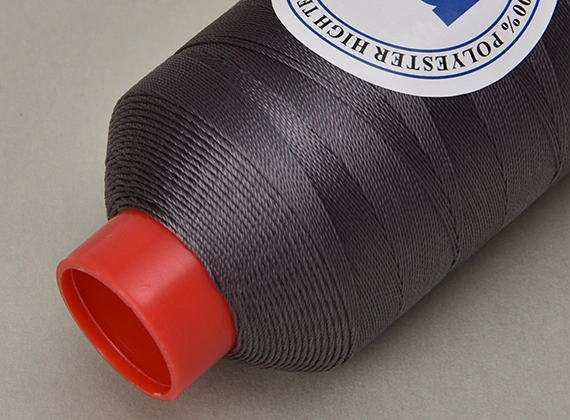
Production: heavy duty polyester sewing thread is a continuous fiber thread often misunderstood due to the term "filament." Many mistakenly associate filament with monofilament, a single-strand thread resembling a fishing line. MonoPoly, for instance, is a type of monofilament thread.However, not all filament threads are monofilament. The larger category is multi-filament threads, which are made of two or more strands twisted together.
Feature: Unlike monofilament, multi-filament threads are smooth, strong, and lint-free, though not transparent. Their lint-free quality provides a significant advantage—keeping your machine cleaner and reducing maintenance needs.
Bonded Polyester Sewing Thread
Production: bonded polyester sewing thread is typically a two, three, or four-ply construction coated with a polymer or resin that keeps the entire thread together during loop formation. The resin can also be applied to single-ply threads to keep them from untwisting during sewing.
Feature: It is a durable thread designed specifically for upholstery applications. Known for its excellent UV resistance, it is a popular choice for outdoor furniture and automotive upholstery. A specialized resin coating enhances its strength and minimizes friction during high-speed stitching, ensuring reliable performance and longevity.
Click here to know the popular 138 bonded polyester thread
Polyester embroidery thread
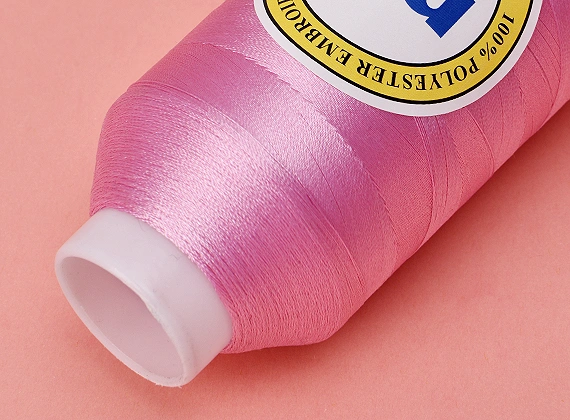
Feature: polyester embroidery thread is made from synthetic polymer fibers, derived from crude oil.
Feature: It is known for its strength, durability, and resistance to chemicals and UV light. Polyester’s durability, versatility, and resistance to fading makes it ideal for items that undergo heavy use or frequent washing. It also comes in many vibrant colors and maintains its sheen over time. Polyester thread is highly resistant to UV rays and weather conditions, making it an excellent choice for outdoor applications. It won’t fade or deteriorate when exposed to sunlight, moisture, or harsh elements.
Click here to know more about polyester vs rayon embroidery thread: Is Polyester Thread Good for Embroidery?
Polyester Thread Size Guide and Its Application

Thread Weight: The weight and thickness of polyester threads are crucial factors in their suitability for different sewing projects. Weight categorizes polyester threads, with common options including 30wt, 40wt, and 50wt. Lower numbers indicate thicker threads, which are appropriate for heavy fabrics, while higher numbers correspond to finer threads.
Thread weights like 40, 50, and 60 are important for diverse sewing tasks, from topstitching to piecing. Choosing the right thread weight impacts the quality of the sewing project, enabling appropriate selections based on design and texture.
English Count: Also referred to as Ne or Number English. An indirect method of expressing the size of a cotton yarn (as the number increases, the physical yarn size decreases). It is the number of times the length of one pound of yarn can be divided by 840.
Click here to get the common polyester thread size chart: Polyester Thread Size
Standard Sizes for All-Purpose Use
Standard polyester threads are perfect for durable embroideries and general sewing, ensuring projects withstand regular use.
One of the key advantages of standard weight threads is the variety of colors available. With a total of 389 single shades, 20 multicolors, and 24 fluorescent shades, there is a wide range to choose from, making it easier to find the perfect match for any project.
The combination of durability and color variety makes standard weight polyester threads a versatile choice for all-purpose sewing.
Learn about: V-69 Polyester Thread - Outdoor Sewing Thread
Fine Thread for Detailed Work
Fine polyester threads are often used for precision stitching in detail-oriented projects like small lettering. Their ability to create intricate patterns and details in embroidery makes them a favorite among those who require high levels of precision in their work.
Fine polyester threads enable the creation of intricate designs requiring clarity and precision. These threads are essential for achieving the fine details that can make a significant difference in the overall appearance of a sewing project.
Very Fine Thread for Precision
Very fine polyester threads are perfect for detailed work like small lettering, intricate filigree, and sewing sequins. These threads are particularly beneficial for embroidery projects that require meticulous execution and precision.
The Polyneon range offers 87 brilliant single shades and 3 fluorescent shades, providing a wide variety of color options. The combination of detailed capabilities and extensive color options makes very fine polyester threads essential for precision in sewing projects.
Ensuring Quality and Reliability
Maintaining quality and reliability in polyester threads is vital for successful sewing projects. Certifications like OEKO-TEX STANDARD 100 confirm that polyester threads are made with safe chemical processes, enhancing consumer safety. This certification indicates that textiles, including polyester threads, are free from harmful substances, promoting safety for users.
Polyester embroidery threads maintain vibrant colors and resist fading, ensuring long-lasting designs. This reliability is essential for projects that require consistent quality over time.
Certified Safe Chemicals
Fine polyester threads are chlorine-resistant, contributing to their safety and longevity. Certifications like OEKO-TEX STANDARD 100 are critical in ensuring that products, including polyester threads, are free from harmful substances.
OEKO-TEX STANDARD 100 certification indicates that the polyester threads meet strict safety criteria regarding chemical residues. This ensures that the threads are suitable for use in various applications without compromising safety.
Abrasion and Looping Resistance
Polyester threads are abrasion-resistant, making them ideal for various durable sewing applications. Their unique composition allows them to withstand daily wear and tear better than many other threads.
Besides abrasion resistance, polyester threads exhibit excellent looping resistance, crucial for maintaining thread integrity during sewing. High-quality polyester threads withstand heavy-duty laundering and mechanical stress without fraying. Looping resistance ensures that the threads do not tangle or create loops during the sewing process, leading to smooth and effective stitching.
Together, these properties provide long-lasting results, ensuring that finished projects retain their quality over time.
Top 12 Largest Polyester Manufacturers in the World (2025)
-
Alpek
-
Bombay Dyeing
-
China Petrochemical
-
Indorama Ventures
-
Mitsui Chemicals
-
Reliance Industries
-
TORAY INDUSTRIES
-
Eastman Chemical Company
-
M&G Chemicals
-
William Barnet & Son
-
Viet Nam Polyester Staple Fiber
-
Coats
-
MH
Click here to purchase in bulk from Chinese Factory Directly: MH Polyester Sewing Threads
Summary
Navigating the world of polyester threads can seem daunting, but understanding the different types, sizes, weights, and customization options can greatly enhance your sewing projects. From spun and core spun to high tenacity and bonded threads, each type offers unique features suitable for various applications. Recognizing the importance of thread size and weight, and customizing your selection to match your project’s needs, ensures that you achieve the best results.
Ensuring quality and reliability through certifications like OEKO-TEX STANDARD 100 and understanding the importance of abrasion and looping resistance will help maintain the integrity and longevity of your sewing projects. By effectively ordering and stocking up on polyester threads, you can always be prepared for any creative endeavor, making your sewing experience both efficient and enjoyable. Dive into your next project with confidence, armed with the knowledge and tools to succeed.
Frequently Asked Questions
- What makes polyester threads suitable for outdoor applications?
Polyester threads are suitable for outdoor applications due to their moisture resistance, durability, and high resistance to tearing, stretching, and abrasion. This combination ensures longevity and performance in various outdoor conditions. - How do I choose the right thread size for my sewing project?
Choosing the right thread size for your sewing project is crucial for achieving optimal results. For general sewing, spun polyester works well, while core spun threads offer extra strength. For heavy fabrics, opt for high tenacity threads, and for outdoor projects, bonded threads are recommended. - What are the benefits of using fine and very fine polyester threads?
Fine and very fine polyester threads offer precision for intricate stitching and detailed embroidery, ensuring high-quality results in your projects. Their strength and durability also enhance the longevity of your work. - How can I ensure the quality of the polyester threads I purchase?
To ensure the quality of polyester threads you purchase, seek certifications like OEKO-TEX STANDARD 100, which confirm that the threads are produced using safe chemical processes and free from harmful substances. This will help you make informed purchases that prioritize safety and quality. - What are the advantages of ordering polyester threads in bulk?
Ordering polyester threads in bulk significantly reduces costs and ensures consistent supply for multiple projects. This approach also typically results in better shipping rates and ensures that you have the necessary materials readily available.
 Whatsapp:
Whatsapp: